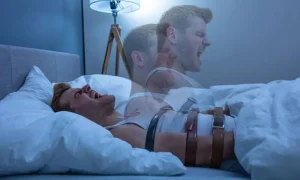Experiencing sleep paralysis involves a conscious awareness but an inability to move physically, often occurring as one transitions between wakefulness and sleep. Among the array of peculiar sensations, the inability to move, particularly while fully aware of one’s surroundings, stands out as a profoundly strange and potentially unnerving phenomenon.
Experiencing sleep paralysis involves a conscious awareness but an inability to move physically, often occurring as one transitions between wakefulness and sleep.
Among the array of peculiar sensations, the inability to move, particularly while fully aware of one’s surroundings, stands out as a profoundly strange and potentially unnerving phenomenon.

Sleep paralysis is an unusual occurrence that can induce fear as the person undergoing it finds themselves unable to move any part of their body while maintaining consciousness. Although this might be a frightening experience, it’s relatively common and does not pose any physical harm.
This phenomenon occurs in two stages – “hypnagogic” before falling asleep and “hypnopompic” upon waking from REM sleep. Hypnagogic sleep paralysis transpires when the mind remains aware while the body involuntarily relaxes during the onset of sleep, leading to a realization of immobility and, often, panic.
During REM sleep, our muscles experience paralysis to prevent acting out dreams. Hypnopompic sleep paralysis occurs when a specific part of the brain wakes sooner than usual, resulting in a state of wakefulness without voluntary control over muscles.
Who experiences sleep paralysis? While some individuals may encounter sleep paralysis once or twice in their life, others may face it frequently, even multiple times a week. Approximately 8 percent of the population encounters frequent sleep paralysis, with higher occurrences among those with mental disorders like anxiety and depression.
Factors such as sleep apnea, certain medications, and underlying sleep conditions can contribute to more frequent episodes. Notable risk factors include:
- Lack of sleep
- Frequent changes in sleep schedule
- Mental conditions like stress or bipolar disorder
- Sleeping on the back
- Sleep problems such as narcolepsy or nighttime leg cramps
- Certain medications, including those for ADHD
- Substance abuse
What are the symptoms? Individuals experiencing sleep paralysis are typically unable to move or speak for a few seconds to a few minutes. This occurs predominantly during the initial stages of falling asleep or immediately upon waking up.
While sleep paralysis often requires no treatment, a doctor may investigate other sleep health aspects. If sleep conditions persist or worsen, a medical professional might refer the individual to a sleep specialist.
Final Thoughts on Seeking Treatment for Sleep Paralysis Given that sleep paralysis occurs naturally, there is generally no specific treatment. However, if an underlying condition is detected during diagnosis, a prescribed treatment plan might be recommended. This could include:
- Implementing a consistent sleeping schedule
- Prescribing an anti-depressant
- Referring to a mental health professional
- Referring to a sleep specialist
- Addressing any underlying sleep disorders
- Prescribing sleeping aids
Prioritizing sufficient sleep and minimizing unnecessary stress, especially before bedtime, is often sufficient to prevent sleep paralysis. While the effectiveness of formal and informal treatments remains ambiguous due to the enigmatic nature of the condition, one episode usually does not necessitate a visit to the doctor. Health professionals advise those with rare episodes to pay attention to their sleep habits, as sleep deprivation increases the likelihood of an episode. Recommendations also include avoiding alcohol, drugs, nicotine, and caffeine, as well as keeping electronic devices out of the bedroom to establish healthy sleep patterns. In the event of an episode, remaining calm and acknowledging that it will pass is crucial.

